Simple Pickled Eggs Recipe
This page may contain affiliate links. More Information.
Pickled eggs recipe is for a refrigerator pickled product.
Pickled eggs are peeled hard-boiled eggs in a pickling brine. The eggs are not processed, so they must be stored in the refrigerator.
Again (cause I really don’t want you to miss this): Any pickled eggs recipe is for a refrigerator product.
This is NOT a canning recipe. Do not store these on the shelf! These eggs can be stored in the refrigerator for several weeks, up to 3 or 4 months.
This Page Includes
- Pickled Eggs Recipe: Extended, Step-By-Step Directions
- Dark & Spicy Pickled Eggs
- Dilled Pickled Eggs Recipe
- Red Beet Pickled Eggs
- Recipe Card
- {FAQ} Why Only for the Refrigerator?
- {FAQ} Why a Hot Brine?
- {FAQ} Should I Sterilize the Jars for Making Pickled Eggs?
- {FAQ} How Long Do Pickled Eggs Keep?
- {FAQ} How Long Until I Can Eat My Pickled Eggs?
- {FAQ} Can You Reuse Pickled Egg Juice?
- {FAQ} Why are My Pickled Eggs Rubbery?
- {FAQ} How Do You Eat Pickled Eggs?
Pickled Eggs Recipe: Extended, Step-By-Step Directions
How to Steam Your Eggs
Regular eggs from the store work fine. Farm fresh eggs are best, but they are also the hardest to peel! As you can see from the pictures, my eggs are not…well, they are not picture perfect. :0
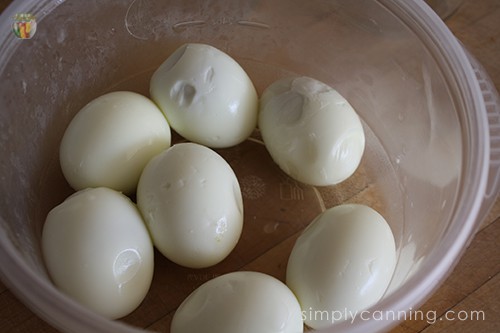
I have this how to hard boil eggs article for making hard-boiled eggs by boiling them. This is the method I used to use. However, since I wrote that post, I discovered steaming eggs! It gives the same resulting hard-cooked eggs but with much easier peeling, especially with farm fresh eggs.
I steamed my eggs using my 4th burner pot. Any steamer will work. When I’m making a lot of eggs, I use this steam juicer. I just take out the juicer part.
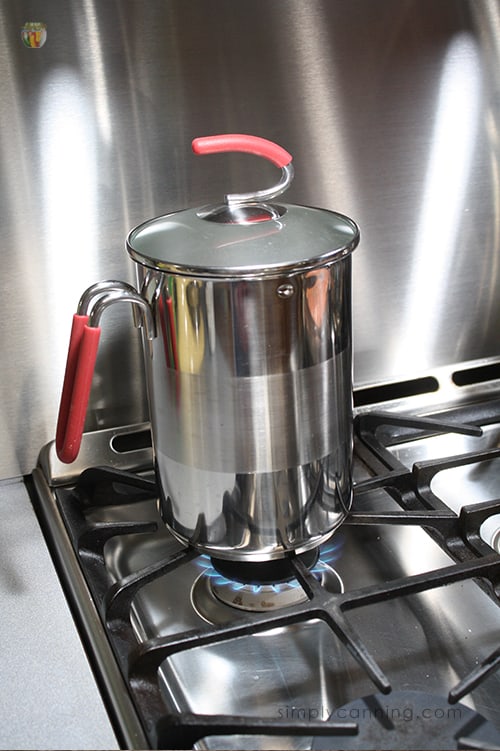
Add a couple inches of water to the bottom of the pot and bring to a boil. Put eggs in the basket into the pot and cover. Steam for approximately 15 minutes.
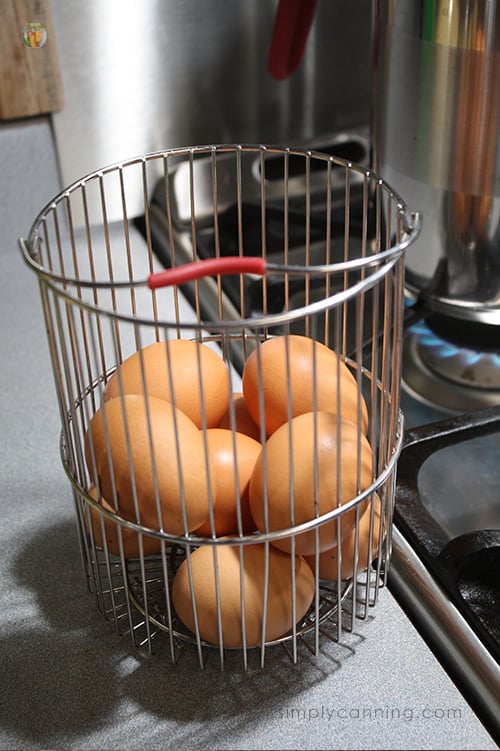
- If you have a lot of eggs, you might want to add a couple minutes.
- Only one or two small eggs? A little less might be enough.
Remove from the heat and run cold water over the eggs to cool them. When you can handle them, start peeling.
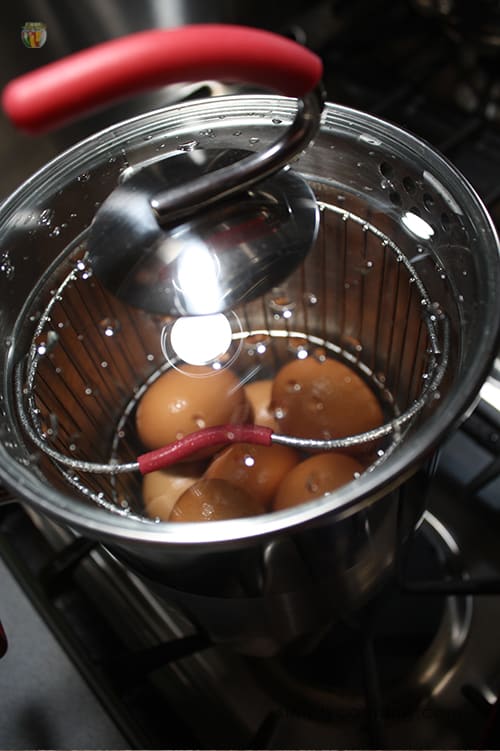
How to Make Pickled Eggs
Three different brine recipes are available below. Putting your jars together uses the same steps for each recipe:
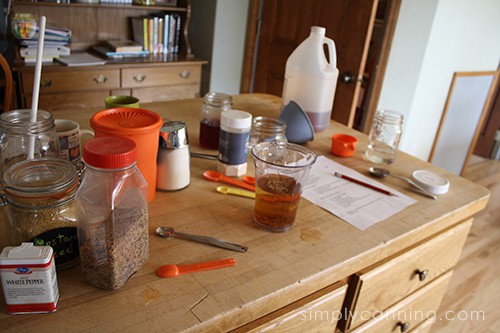
- Cook hard-boiled eggs and peel.
- Bring all the ingredients (except the eggs) to a boil. Reduce the heat and simmer for 5 minutes.
- Pack peeled, hard-cooked eggs loosely into warm jars.
- Pour the hot pickling solution over the eggs in the jars. There needs to be enough pickling solution to completely cover the eggs.
- Cover the jars and refrigerate immediately. Pretty easy!
Here’s the Process:
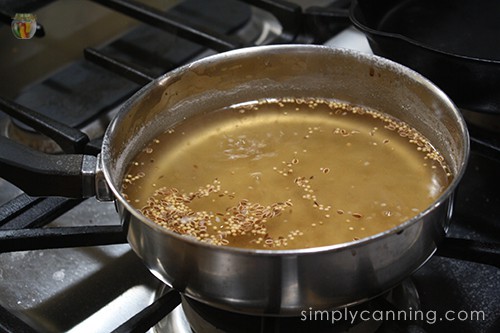
Make your brine.
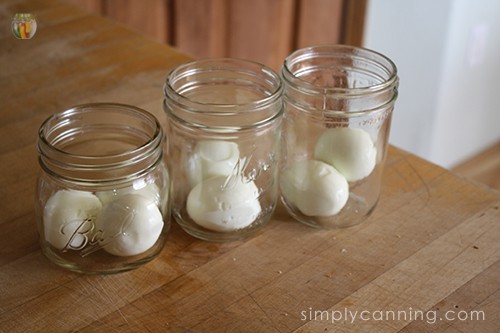
Put hard cooked eggs in jars. A 1-quart jar will hold approximately 12 eggs. I used pints to make small batches.
Add your hot brine to the jars. I much prefer to make smaller batches. I’m making 3 different recipes today, thus 3 smaller jars with 2-3 eggs each.
3 Pickled Eggs Recipes for You to Try
There are many pickled eggs recipes online. These are recipes that have been tested for home storage (in the fridge) and come from the NCHFP website. The dark and spicy is hands down our favorite. I use liquid smoke and call it “smoky eggs.”
Dark & Spicy Pickled Eggs
- 1 1/2 cups cider vinegar
- 1/2 cup water
- 1 Tbsp. dark brown sugar
- 2 tsp. granulated sugar
- 1 tsp. mixed pickling spice
- 1/2 tsp. liquid smoke or hickory smoke salt
- 2 tsp. salt
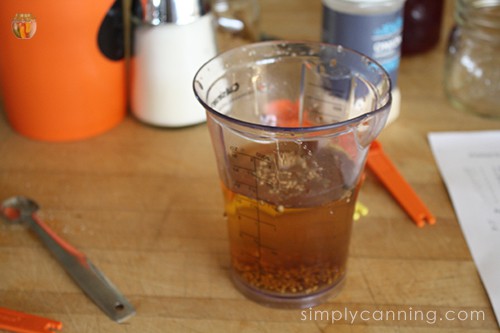
Dilled Pickled Eggs Recipe
- 1 1/2 cups white vinegar
- 1 cup water
- 3/4 tsp. dill weed
- 1/4 tsp. white pepper
- 3 tsp. salt
- 1/2 tsp. mustard seed
- 1/2 tsp. minced onion
- 1 peeled garlic clove
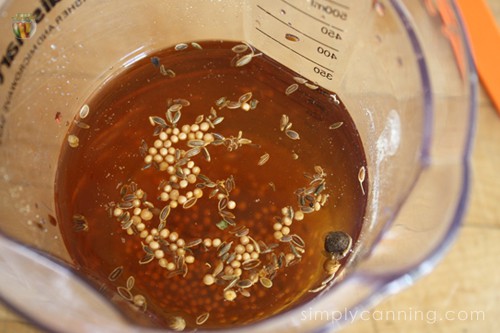
Red Beet Pickled Eggs
- 1 cup red beet juice (from canned beets)
- 11/2 cups cider vinegar
- 1 tsp. brown sugar
- small home canned red beets, or a couple of slices
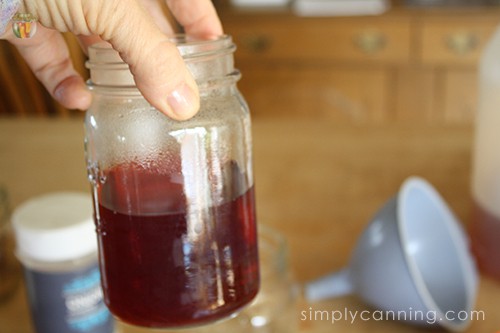
I wanted to add a picture of these eggs as they look when you slice them. The color goes through the whites of the eggs! (Honestly, I’m not totally sure how appealing that is, haha.)
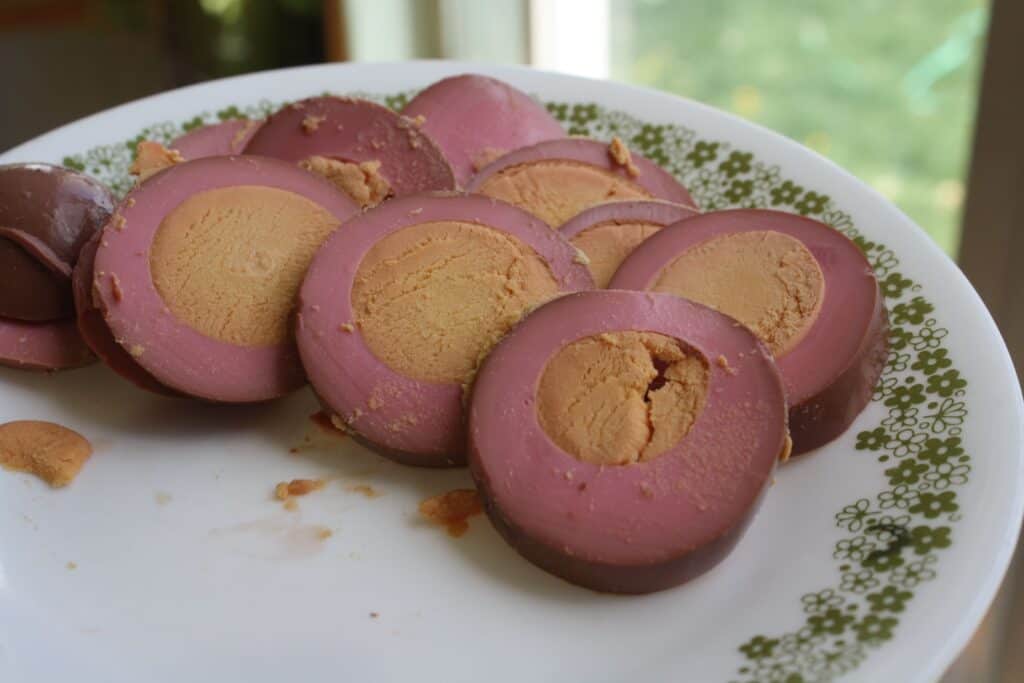
These are Just Refrigerator Pickles!
I really feel the need to emphasize this. These are not for preserving and keeping on the shelf. Do not process these in a pressure canner. Put them in your fridge and enjoy!
Remember, I made small batches. I took each of the recipes, divided them in half, and measured them out into jars. Then I heated each recipe to a boil for 5 minutes before pouring them over jars with the eggs.
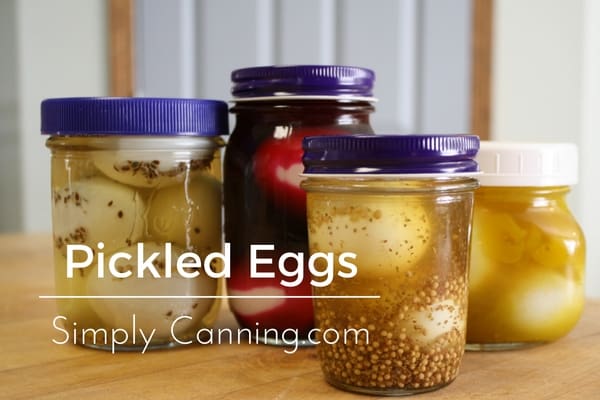
Pinnable Recipe
Pickled Egg Recipe Tips & FAQs
Why Only for the Refrigerator?
To my knowledge, there are no pickled egg recipes that are available for storage on the shelf. You may wonder why you can purchase pickled eggs on the shelf at the supermarket. That is because they are commercially processed, and that is an entirely different process than what is available to a home cook.
The lovely thing about pickled eggs is the variety. Many different recipes exist for pickled eggs.
In this batch that I’m working on, I took several recipes and halved them so I can make smaller batches of several types. You can always do a full batch, which will produce enough brine for approximately 12 eggs.
Why a Hot Brine?
Notice that your eggs should be cooled so you can handle them to peel, but the brine should be hot when you pour it over the eggs.
I’ve read that keeping the brine hot when you pour it over your eggs keeps the egg whites more tender. I have no idea why! I’ve never tested it myself; I always pour my brine over hot.
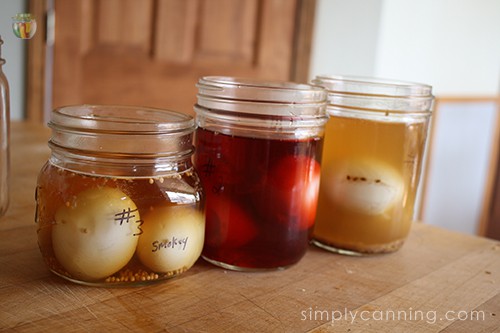
Should I Sterilize the Jars for Making Pickled Eggs?
Full disclosure here: The NCHFP recommends sterilizing your jars before you make pickled eggs.
“Be sure to wash all utensils and surface areas (including hands) very well and sanitize jars for 10 minutes in boiling water before filling with boiled eggs if you expect to keep them for more than several days.”
I’ll be honest, I don’t “sanitize” my jars for pickled eggs. I do, however, wash and rinse very thoroughly!
This product is not processed and so is not going to be preserved as food is when it goes through the pressure or water bath canner. Thus, the reason for only putting this in the refrigerator. However, everything DOES need to be super clean.
This is my thinking…you make your own decision. You’ve got good sense; use it. Do what you feel is right.
If you feel more comfortable sterilizing your jars, that is great! Go for it. Here is some information on sterilizing jars with the canning process. That page also has full instruction on how to sterilize jars.
How to properly sterilize canning jars.
How Long Do Pickled Eggs Keep?
Pickled eggs will last for 3-4 months in the refrigerator according to the NCHFP. They don’t give a hard and fast expiration date, but state “for best quality”. I don’t keep mine that long. A month or 6 weeks, and I’m ready to dispose of them. That is personal preference. You’ll be safe going with the suggested 3-4 months with these recipes.
Remember…they MUST be kept refrigerated. Do not leave them out on the counter! Botulism has been reported with eggs that were left at room temperature.
How Long Until I Can Eat My Pickled Eggs?
You can actually eat them right away if you want, but you’ll be disappointed. For that pickled flavor to penetrate your eggs, allow them to sit in the fridge for a week or two. Even longer will give more flavor.
Can You Reuse Pickled Egg Juice?
I would not advise reusing pickled egg juice. You should provide a fresh brine for each batch.
Why are My Pickled Eggs Rubbery?
From online research, this usually happens as a result of keeping them in the brine too long. Also make sure you’ve cooked your hard boiled eggs properly, as eggs can get rubbery if you cook them too long.
How Do You Eat Pickled Eggs?
They are just a snack to eat as is. A different way to make hard boiled eggs. You can slice them up and add them to a relish tray. If you are going to a potluck with these, be sure and mark them pickled so people aren’t surprised!
Here are a couple of ideas I haven’t tried but I think would work: I bet they would make interesting deviled eggs. Add a little spunk to it! Haha. Pickled eggs would add some flavor to a potato salad as well.
My family just eats them. The smoky recipe is their favorite.
Related Pages
Pickle Recipes
When you think of pickle recipes you probably think immediately of cucumber pickles. However, pickling is not just for cucumbers!
Pickled Beets
Put those fresh-picked beets to use by making homemade beet pickles! Canning and pickling at its finest…
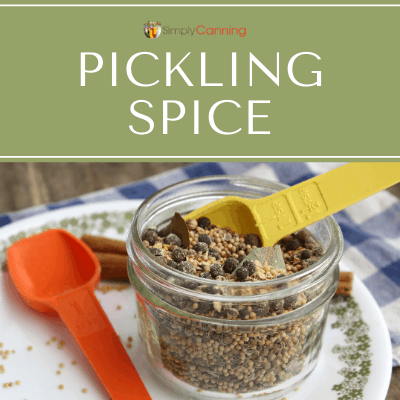
Pickling Spice
Learn how to make homemade pickling spices! There are lots of uses for this easy recipe.
Pin This for Later!
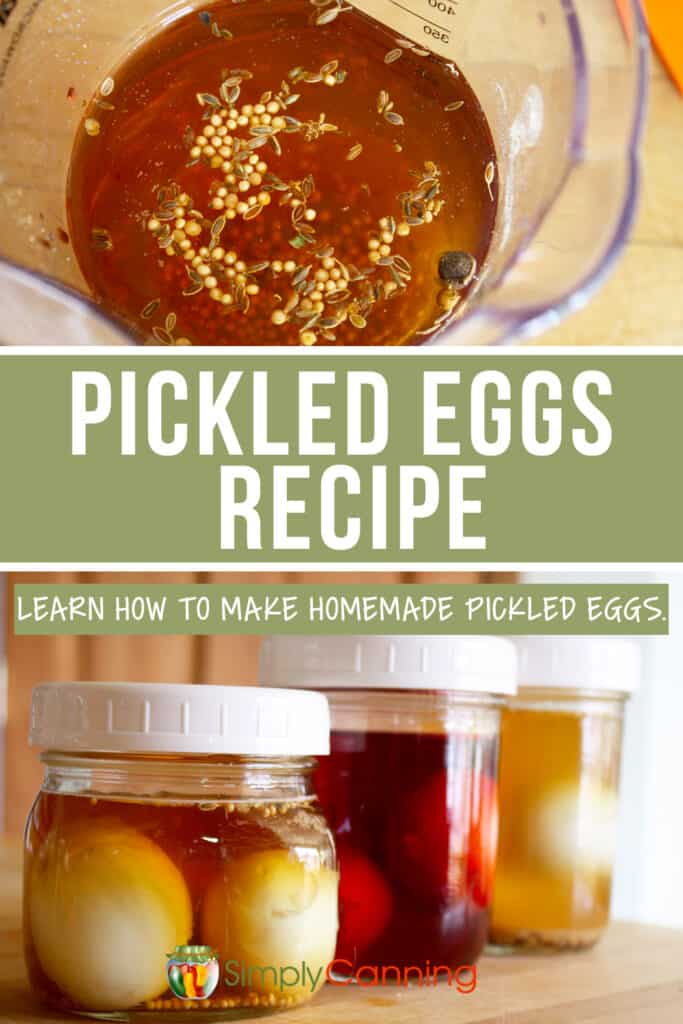
Sources: National Center for Home Food Preservation, Washington State University Extension
Page last updated: 4/22/2021.

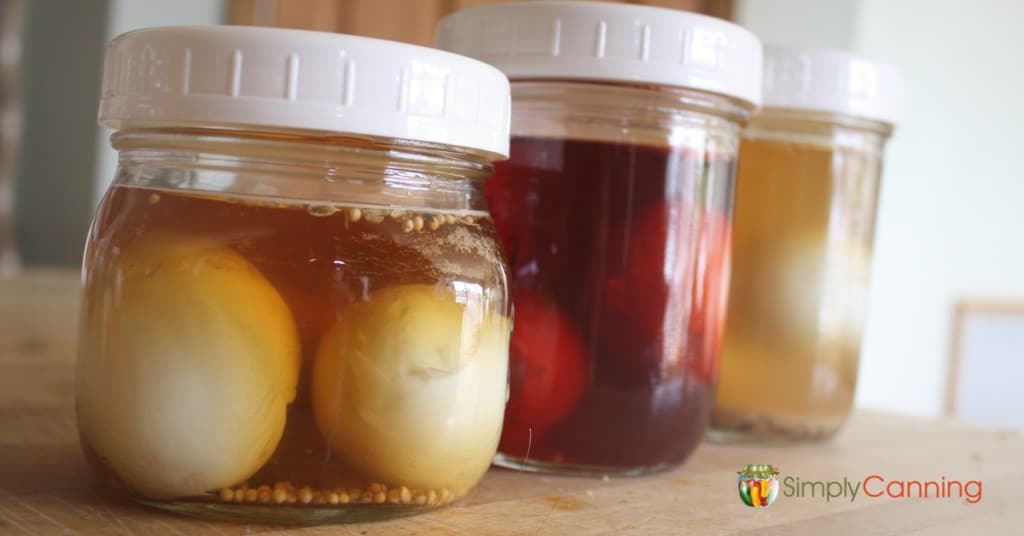
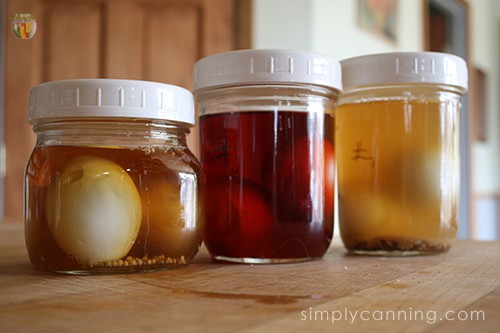
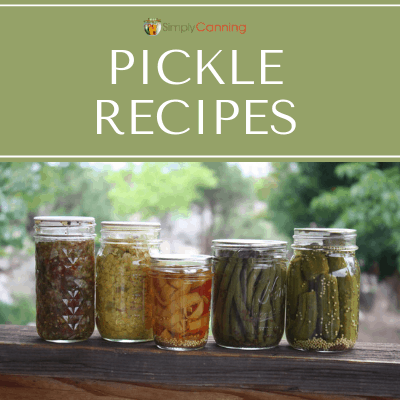
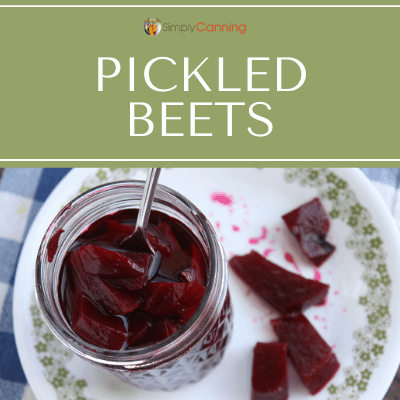
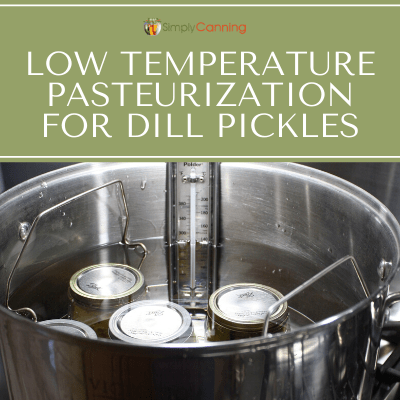

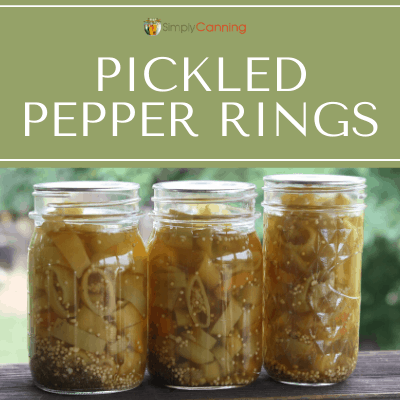
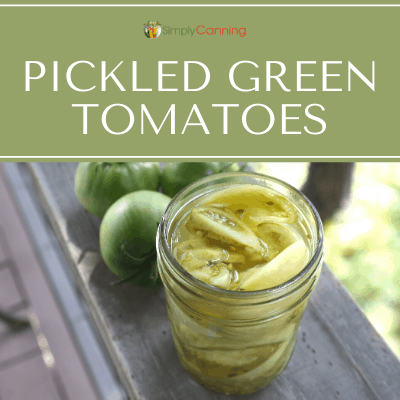
In your dill pickle eggs what kind of salt
Just regular table salt or canning salt, I think.
-Rachel (Sharon’s assistant)
i use canning salt it keeps them from looking cloudy